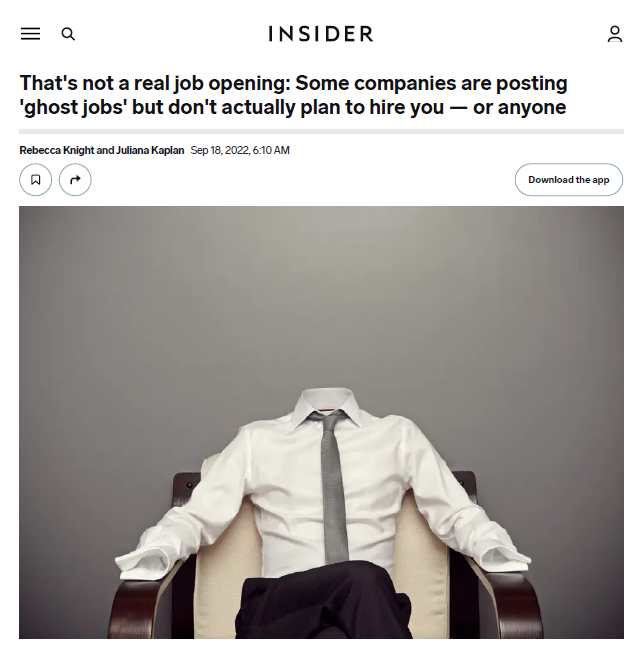Some companies are posting ‘ghost jobs’ but don’t actually plan to hire you — or anyone
Business Insider original article here
The number of job openings has been sky high over the past year in the red-hot labor market.
But some job seekers are still striking out, especially as the economy faces headwinds.
That could be because some firms are posting “ghost jobs” that they’re not actually hiring for.
After applying to more than 300 jobs in the last six months without a single bite, Will no
longer bothers to read job descriptions or research companies.
It’s just a waste of time at this point, said Will, whose real name is withheld but known to
Insider.
He spends six to 10 hours a day on LinkedIn churning out applications, but says that he and
his peers with similar credentials — master’s degrees and MBAs from top schools — are
having no luck getting interviews.
“I’m seeing all of these articles about how companies cannot recruit people fast enough and
how there’s all these job openings,” said Will, who aims to land a consulting role. “But I’m also
seeing my own personal experience and seeing other highly qualified candidates who can’t
get interviews or can’t get jobs and I’m like, ‘Something is wrong with the system.'”
It is a puzzle in this remarkably tight labor market. While many employers can’t find enough
workers, some qualified candidates are applying to open jobs and aren’t hearing anything
back.
That applicants are, on occasion, ghosted by employers is nothing new, of course. But lately
questions have been raised about whether a company’s job postings are reflective of actual
open positions, or instead “ghost jobs” — listings that employers are no longer actively hiring
or recruiting for.

Some researchers say that “job openings” might mean something different today than it used
to, and that companies routinely adjust to forces in the economy and their industries by
ramping up and down the intensity with which they recruit. Others, meanwhile, have
speculated that companies today are posting jobs but not trying hard to fill them, perhaps due
to uncertainties about the economy. But at a time when many workers are still quitting their
jobs at elevated rates emboldened by the apparent strength of the labor market, the ghost job
phenomenon underscores the idea that employers still have the upper hand.
“Evergreen” postings in an uncertain environment
There are many reasons why companies might post vacancies with seemingly little urgency to
fill them, recruiters say. Sometimes they want to give the impression that the company is
growing — but in an inflationary economy, growth is expensive, so they’re hedging their bets.
Sometimes they leave listings open with dreams that the perfect, unicorn candidate might
apply. Other times they might post jobs to pacify their exhausted employees and demonstrate
that they are indeed at least trying to hire more help.
There are also some jobs that are so in-demand — think: mobile developers and software
engineers — that employers might leave up openings in hopes that someone, anyone will
apply.
Some recruiters say that ghost jobs are on the rise due to the heightened level of uncertainty
that’s persisted for the past two and a half years. With the enduring labor shortage and high
turnover, they can no longer accurately predict candidate behavior and flow. That, combined
with a slowing economy, has created an air of tentativeness.
William Stonehouse, the president of Crawford Thomas Recruiting, the Orlando staffing firm
that matches jobseekers with Fortune 1000 companies, said that he often coaches employers
on the perils of posting ghost jobs.
“A lot of businesses don’t understand the impact that a negative hiring process can have on
future applicants,” he said. “If your listings are a graveyard of old positions and candidates are
uploading applications into a resume black hole, it doesn’t set a good tone. People want to be
treated with dignity and respect.”

Andrew Flowers, a labor economist at Appcast, the recruitment advertising technology
company, expressed skepticism that “ghost jobs” are a widespread problem.
Flowers pointed out that the overall job fill rate, the ratio of hires to openings in each month,
remains very low, which reflects the tight labor market. Meanwhile, other economic research
shows that recruiting intensity matters less for the job search-and-matching process than
factors like candidate skills and quality and the macroeconomic environment.
About Crawford Thomas Recruiting:
Crawford Thomas is a team of leading HR recruiters. We not only fill staffing needs, we partner with organizations to find out how their recruiting needs tie into their business objectives. Through this, we are able to meet your staffing needs in a way that achieves organizational success.
Start securing top talent by visiting our page for employers today.

